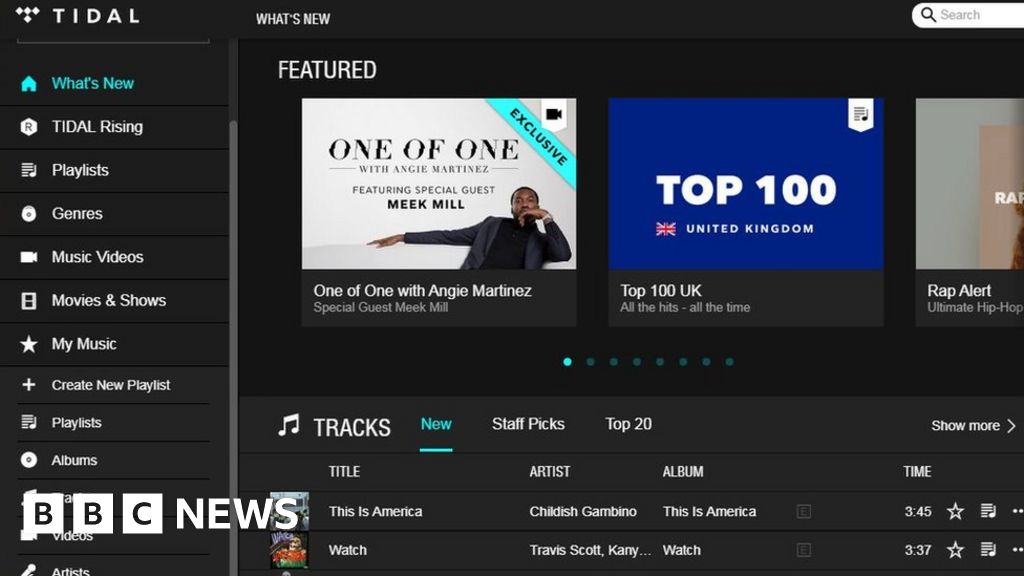Tidal Accused Of Manipulating Beyonce And Kanye West Data

 Image copyright
Sony/Universal
Image copyright
Sony/Universal
Music streaming app Tidal has been accused of inflating audience figures for two albums - Lemonade by Beyonce, and The Life of Pablo by Kanye West.
A Norwegian-language newspaper claims the move would have led Tidal to have paid disproportionate royalties to the singers' record companies at the expense of other artists.
Tidal is part-owned by Jay Z. He is Beyonce's husband and a long-term friend of Kanye West.
Tidal has denied the allegations.
"This is a smear campaign from a publication that once referred to our employee [chief operating officer Lior Tibon] as an 'Israeli intelligence officer' and our owner as a 'crack dealer'," it said in a statement.
"We expect nothing less from them than this ridiculous story, lies and falsehoods.
"The information was stolen and manipulated. And we will fight these claims vigorously."
The newspaper, Dagens Naeringsliv (DN), reported it had no information to suggest that Beyonce or Kanye West would have known their listening numbers had been faked.
Nor does it present any evidence that Jay Z himself would have been aware of the figures being altered.
But the paper's editor-in-chief said it stood by the claims that had been published.
"We have since February tried to get comments from Tidal to our well-documented story," said Amund Djuve.
"They have not been willing to answer detailed questions about the manipulated data.
"Tidal let the company's American lawyers answer. And their response was that the data were stolen and manipulated by us. This is of course not true."
Tidal had the exclusive streaming rights to both the albums in question when they first launched.
DN claims to have obtained royalty reports that show Tidal paid Sony Music $2.5m (£1.8m) in April and May 2016 for its members' listens to Lemonade's tracks.
And it says that the Malmo, Sweden-based company paid 2m euros ($3.0m; £2.2m) to Universal Music in February and March the same year to cover its users playing songs from The Life of Pablo.
DN claims to have obtained a hard drive containing further "extensive data" from an unnamed source that indicates these sums were excessive.
To support its claim, the paper enrolled the help of researchers at the Norwegian University of Science and Technology, who have published their own report.
Their analysis indicates that more than 320 million false play records had been logged for the two albums, affecting more than 1.7 million user accounts.
"Due to the targeted nature and extent of the manipulation, it is very unlikely that this manipulation was solely the result of a code-based bug or other anomalies," their study said.
A spokesman for the university added: "Our researchers have used advanced statistical analysis methods to reach this conclusion. However we cannot, based on the data provided to us, determine the source of the manipulation."
DN also reported that it had identified and tracked down several Tidal users from the logs.
It said they had disputed listening to the two albums' songs as frequently as the records indicated and in some cases had evidence they would not having been using the app at the registered times.
Despite Tidal's denials, one trade body has already voiced concerns.
"If this is true, many record labels and artists have lost out," the Independent Music Labels Association (Impala) tweeted.
From Chip War To Cloud War: The Next Frontier In Global Tech Competition
The global chip war, characterized by intense competition among nations and corporations for supremacy in semiconductor ... Read more
The High Stakes Of Tech Regulation: Security Risks And Market Dynamics
The influence of tech giants in the global economy continues to grow, raising crucial questions about how to balance sec... Read more
The Tyranny Of Instagram Interiors: Why It's Time To Break Free From Algorithm-Driven Aesthetics
Instagram has become a dominant force in shaping interior design trends, offering a seemingly endless stream of inspirat... Read more
The Data Crunch In AI: Strategies For Sustainability
Exploring solutions to the imminent exhaustion of internet data for AI training.As the artificial intelligence (AI) indu... Read more
Google Abandons Four-Year Effort To Remove Cookies From Chrome Browser
After four years of dedicated effort, Google has decided to abandon its plan to remove third-party cookies from its Chro... Read more
LinkedIn Embraces AI And Gamification To Drive User Engagement And Revenue
In an effort to tackle slowing revenue growth and enhance user engagement, LinkedIn is turning to artificial intelligenc... Read more

